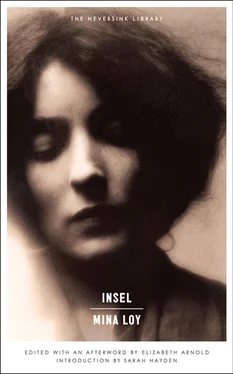That evening I began a letter to a friend: “Aaron’s latest surrealist is absolutely divine. He has painted a picture that’s not so very hot in any particular detail — a gigantic back of a commonplace woman looking at the sky. It’s here to be shipped with the consignment I am sending to Aaron, and I swear whenever I’m in the room with it I catch myself staring at that sky waiting, oblivious of time, for whatever is about to appear in it. Most eerie! The man himself is just like that. He did not say anything in particular, but you felt you were in the room with an invisible will-o’-the-wisp, and that any moment it might light up. He’s the son, he said, of tiny working people and seems the most delicate and refined soul I’ve ever come across. He has an evening suit, but never an occasion to wear it, so he puts it on when he paints his pictures, first having meticulously cleaned everything in his studio. Now, I don’t mean he’s a delicate soul because he paints in evening dress—! That’s just one of his stories I remember. I shall probably find this quality exists only in my imagination because there’s something fundamentally black-magicky about the surrealists, and I feel that going in that direction, his face, that looks almost luminous from starvation, will turn out to be a death’s head after all.
“It’s funny how people who get mixed up with black magic do suddenly look like death’s heads — they will grin and there is nothing but a skull peering at you, at once it’s all over — but you remember. Sex is an exception. He is permanently a skull with ligaments attached, having the false eyes of an angel, and, at the back of them his cranium full of intellectual dust. Often they look like goat’s. While Moto has the expression of an outrageous ram, his wife the re-animated mummy of an Egyptian sorceress. In fact, they are very, in their fantastic ways, expressive of their art, which after all takes on such shapes as would seethe from a cauldron overcast by some wizard’s tortuous will.”
The letter was never finished, for, and this was often to be the case, once he had left, his person would gradually gather together till at last one could normally see him as he really was, or had been when present. Tall, his torso concave, he was so emaciated that from his waist down he looked like a stork on one leg. His queer ashen face seemed veritably patched with the bruises of some physical defeat that had left him pretty repulsive. One’s mind, released from the unaccountable influence of his nature’s emanations, readjusted the time spent in his company to the rational proportion of an interview with a plain, eccentric, somewhat threadbare man, strangely pitiable in a premature old age. His manner alone remained unchanged by this surprising reverse — it was of an extreme distinction. Owing to this, before my letter drew to a close, I had lost the impression of whatever had inspired it, finding myself very much in the situation of Titania confronted with entirely meaningless donkey’s ears.
It argued a certain good fortune, in Insel’s timing of his next visit, that it should coincide with that of a German girl, as his absolute inability to acquire any language to add to his own must have made his inhabitation of a foreign land a somewhat lonely affair. But in how far I found it at last impossible to determine, so narrowly his unformulated existence seemed associated with itself. Her visit was fortunate for me also, for later on, in our checking up on the subject of this very Insel, she, so common-sensed and unimaginative, was able to clear my doubt as to whether it was I who must be mentally deranged. Wishing to get on familiar terms with an acknowledged surrealist, we took him to a cafe, and, in the embracing glare of a locality above all others conducive to the liberal exchange of confidences between the most heterogeneous people, the meager personality of this stranded German opened up.
I still retain wisps of the irreal crises in his footloose career that, as he related it, grew up, story by story, a frail edifice of lies and memory out of our marble tabletop. It was securely buttressed by groups of obese tradesmen who, in their agglomerated leisure, were playing belote . He told us, his gray eyes atwinkle with the inner security the possession of a strange surplus fortune, balancing destitution, gives to men of genius, he had solved the problem of keeping alive without any money and thus had lived for sixteen years.
A man who finds himself economically nude, should logically, in the thickset iron forest of our industrial structure, be banged to death from running into its fearfully rigid supports. He is again the primordial soft-machine without the protective overall of the daily job in which his fellows wend their way to some extent unbattered by this sphere of activity. For them, the atrocious jaws of the gigantic organism will open at fixed intervals and spit at them rations sufficient to sustain their coalescence with the screeching, booming, crashing dynamism of the universal “works.” For the révolté , for one incapable of taking it as it is, this metal forest of coin bearing machinery will partially revert to the condition of nature preserved in him, and show patches of moss as if he had projected there some of the verdure rooted in him. Oases of leisure, succorable, soft if ragged lining to the cage of practical mankind, these mossy refuges, along the life of a wayward spirit who refuses to do as he is told, preferring to find out for himself what to do, mostly materialize as the hospitalities of modest little women who find a temporary relief from their innate anxiety in association with an irresponsible man in whom the honest desire for survival of his creative impulse gets dishonestly mixed up with his amatory instinct.
Insel, as he talked, seemed to be recurrently emerging from predicaments of which, if some were lamentable, many were quite diaphanous as though nothing of him but the most subtle aspects of his peculiar temperament had got into them — He varnished his painting of the past with a gentle irritation of commentarial laughter. Unlike other men, he took delight in confessing that all his women had deserted him, divorced him, thrown him out. How he had pled with those women to have patience. “I am tired of supporting a waster,” they would tell him at last. “But they were wrong,” averred Insel. “While I appeared irretrievably idle, Ich habe mich entwickelt —I was developing,” he explained, the mischief dancing defiantly in his eyes. And this Entwicklung I would not estimate blurred my view of Insel. I saw his image grown suddenly faint, imploring the shadow of woman “—to only wait — in the end — the end — I shall achieve glory.”
These unfortunate separations, throwing him back upon the desert base from which he was ever setting out anew, formed part of the frieze of disaster through which he represented himself as forever fleeing under the vicious darts of his drastic horoscope.
Housing his poverty as animals tracked down enter abandoned holes or a honeyless bee might return to an empty hive — of all the makeshift burrows he found for himself in an unearned earth, so desolate and perilous seemed his escapade in some far away, dismantled villa he described to us that it has stuck in my mind. He had lived there one summer, with some caressive Mädchen who, when she left the place, had forgotten to ask him to give up his key. And so it was that Insel, fallen once more under the heel of fate, crept back to that love-swept lair and, shutting himself up in one of the rooms, lived on the floor. “I could draw there,” he pointed out to us thankfully. And one saw him, day alone, morrow alone, where the air was the breath of his own hunger, warily sneaking out at dark in search of a remnant of food, or, just as possibly, so complex is the status of the artist, dining with affable millionaires every other night. It comes back to me now that Insel had started this episode as the story of a haunted house.
Читать дальше












